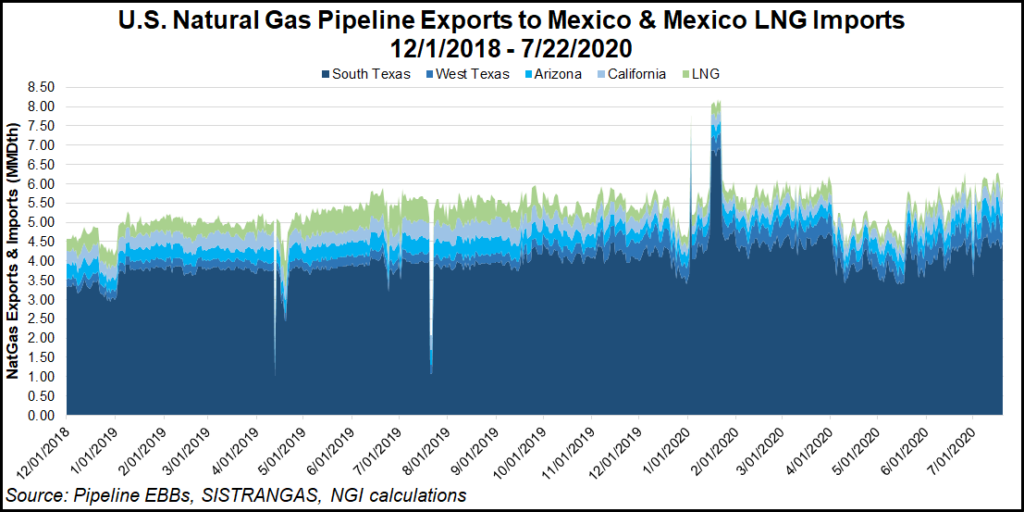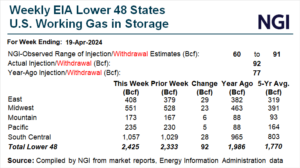Regulatory | NGI All News Access | NGI The Weekly Gas Market Report
Mexico Energy Regulator Losing Independence, Not Fulfilling Duties Under AMLO Government, Former Commissioners Say

Mexico’s Comisión Reguladora de Energía (CRE) is losing its independence and failing to carry out its constitutional mandate under the current government, according to a former chairman and two former commissioners of the energy regulator.
Created in 1994 under the liberalizing economic reforms of former president Carlos Salinas de Gortari, the CRE performs similar functions to the U.S. Federal Energy Regulatory Commission, overseeing permitting and regulations in the electric power and non-upstream oil and gas segments of the energy industry.
Since President Andrés Manuel López Obrador took office in December 2018, CRE has seen budget cuts, mass layoffs, resignations of several commissioners appointed under the previous government, accusations by the president of impropriety, and highly controversial new appointees viewed as political allies of López Obrador and lacking the necessary technical background to serve as commissioners.
The 2014 coordinated energy regulators law, part of the larger 2013-2014 constitutional energy reform opening the sector to private competition, mandates that the CRE “will encourage the efficient development of the industry, promote competition in the sector, protect the interests of users,” and ensure the reliable supply of energy services to the country.
However, the current regime is impeding CRE from performing these duties, said Francisco Xavier Salazar, who served as CRE chairman from 2005-2015, during a webinar co-hosted by the Woodrow Wilson Center and Institute of the Americas think tanks earlier this month.
“You can create a perfect system, you can create a perfect set of rules, but if you have someone in the government that doesn’t respect the law, everything is going to fail,” Salazar said. “Part of the problem with this government is that it does not respect what is written in the law.”
A prime example, he said, is the four nominees pushed through by the president to fill vacant commissioner spots, despite the nominees being rejected twice by the senate. Although senate approval is not technically required, “if the government was going to comply with what is written in the law, we should have a different composition of the governing board of CRE,” Salazar said, “because it is precisely stated [in the law] that you should have experience, and experience was not demonstrated for the people that arrived there.”
One of the commissioners who resigned was Montserrat Ramiro, now a global fellow at the Wilson Center, who served as commissioner from 2015-2019 and who shared the virtual stage with Salazar.
Ramiro said that the new CRE commissioners “have no sense of what they’re there to do…and that is important because in the very end of things, what happens is investment goes to zero. And that’s what you’re seeing right now in the power sector in Mexico.”
She also expressed concern about the increased burning of high sulfur fuel oil (HSFO) over the last year or so by state power utility Comisión Federal de Electricidad (CFE) in the Mexico City area as opposed to cleaner burning natural gas, which Ramiro said is happening because there is an excess of fuel oil at the refineries of state oil company Petróleos Mexicanos (Pemex).
A question the CRE should be posing to CFE, she said, is, “Why are you burning fuel oil if it’s more expensive and it just ruins air quality in the biggest city in Mexico?”
Also on the virtual panel was Guillermo Zuñiga, a CRE commissioner from 2013-2019, who said that the level playing field in Mexico’s energy sector “has not survived” under the current regime, citing design flaws in the various liberalizing energy reforms passed by the Mexican congress since 1992.
For example, he said the law does not afford CRE the same level of autonomy and independence given to antitrust watchdog Comisión Federal de Competencia Económica (Cofece), which has emerged as one of the few effective counterweights against the state-centric energy policies of López Obrador.
He also highlighted that while the 2013-2014 reform was supposed to create a level playing field for private sector firms to compete with CFE and Pemex, the law still designates the energy minister as chairman of both state companies’ boards, making the companies more subject to the political whims of the administration in power.
All three former commissioners said that over the long-term they expect the liberalization of Mexico’s energy sector to continue, but probably not until the next government takes over in 2024.
© 2024 Natural Gas Intelligence. All rights reserved.
ISSN © 2577-9877 | ISSN © 2577-9966 | ISSN © 1532-1266 |


